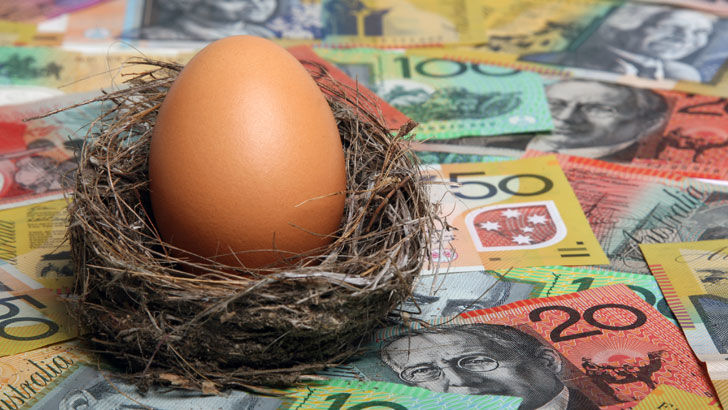Six changes you should make to lift your lifestyle in retirement
By Julia Newbould
The policy, research and advocacy body for Australian superannuation, ASFA, calculates two important retirement income statistics each year: the amount needed for a modest retirement and the amount for a comfortable retirement.
ASFA's definition of a modest retirement is not much above the poverty line and not much above the aged pension at $67 a day. The amount for a comfortable retirement is a little more.
"Comfortable means you can go to the club and have a meal or have a big overseas holiday every seven years. It's about having dignity in retirement, and having worked so hard your entire life you deserve not to worry about every penny," says ASFA deputy chief executive Glenn McCrea.
The standard is calculated by looking at what most Australians want in retirement, through surveying focus groups of retirees and pre-retirees, and also using the Australian Bureau of Statistics expenditure weighted box of goods and services.
The amount for a modest lifestyle, if you are a homeowner, is calculated as $40,000pa for a couple and $28,000 for a single person. For a comfortable lifestyle, it's $62,000 for a couple and $44,000 for a single.
"You need significantly more if renting," says McCrea. "It's worth acknowledging that around 25% of retirees reach the comfortable standard at the moment, but we want to get it to 50% by 2050.
We need to lift the super guarantee system to 12% and have people contributing to their super."
He says this translates to lump sums of about $640,000 for a couple and $540,000 for a single person, receiving a little bit of pension and drawing down some super. "The key thing here is these are the benchmarks to aim for - check your balance, see how you're tracking and see if you have the capacity to chip in a bit extra."
Six ways to improve your lifestyle
1. Reap the tax benefits
When it comes to retiring early, people get hung up on frugality - not spending now and diverting extra money into saving for the future.
Few people consider the simple tax effectiveness of super. By using your concessional contributions you can save considerable amounts of earnings through tax concessions. For example, someone earning the average income of about $90,000 pays 34.5%, including the Medicare levy, as their marginal tax rate. This can be reduced to 15% - a saving of 19.5% - by contributing up to a maximum of $25,000 a year into super.
In simple terms, if someone saves $10,000 into their super, the tax concession means they are only paying $1500, as opposed to $3450.
Further, earnings on income generated within super are only taxed at 15%, making it even more effective.
2. Small fees make a big impact
Fees can make a significant difference to your super balance in retirement.
"Make sure you're conscious about fees and ensure you understand exactly what you're paying," says Kate McCallum, principal at Multiforte Financial Services.
"Don't just think 'I'm in an industry fund therefore it's cheaper' or 'I'm in an employer fund therefore it's cheaper' because that's not necessarily the case.
"The average super fee is now around 1.03% so you should be able to get your total super fees at 1% or less. A big part of this is to make sure you're not paying expensive investment management fees as well."
People may be attracted to a fund that doesn't charge admin fees but then there is an investment fee of 1.5%.
"I did an analysis for a prospective new client the other day and she said there's no admin fee, which she thought sounded good. But the investment cost had two components, which when added together were 1.06% and so even though the admin fee was being waived, the investment fees were high compared to others," says McCallum.
"It's worth doing the work as it can be a big drag on your money, particularly as your balance gets larger."
3. Find the sweet spot
There is a level of superannuation you can have and still get the maximum aged pension amount. However, income and assets tests can
be tricky; unless you're retiring imminently, you can't be 100% sure of the sweet spot.
"Anyone trying to retire without talking to an adviser is not making the right move," says Nicole Heales, principal at Nicole Heales Financial. "It's a massive change in your life that you need to get your head around, and you need to understand the pitfalls to use the system the best way.
"With COVID-19, everyone has dropped their costs of living but it's given us the opportunity to understand what life used to look like - we didn't always get on planes to go on holidays. That's how life's meant to be and it will be how life will look in retirement as well - what actually makes you happy and what do you need?"
According to Heales, the younger generation has become more conservative and there are 30-year-olds paying attention to their superannuation.
"I think 40 is a good age to start. It's when people start thinking, 'I'm not young anymore and I have 25 years to get this organised', and that's when the rubber hits the road," she says. "If you can get to people earlier that's even better - 35 would be ideal from a time perspective."

4. Choose your investments
When it comes to the investments themselves, McCallum says the main thing is not to blindly accept the default your fund might put you into.
"If you're young and can handle a lot of volatility, it makes sense to have a more growth-oriented portfolio, but if you are nearing retirement and you are still comfortable with the volatility, and you have some defensive assets, you don't have to go super conservative," she says.
"What we have to remember is that even if we retire at 60, the money may still have to last another 30 years. You need the extra grunt that capital growth assets give you. It's not that you should be in a growth portfolio, it's about being discerning and conscious of your investment choices.
"I think that the aged-based defaults can be limiting for someone who retires at 65 and needs their money to last. If you go too conservative in a relatively low-interest-rate environment, the risk is it won't last. You have to balance capital growth and level of volatility - you need a willingness to have risky assets and the ability to take the risk."
Nicole Heales says super is only one part of an overall financial plan, but since it's almost 10% of your employment earnings you need to ensure that the super guarantee is working for you.
Heales says she encourages people to think about how much they might need in retirement. For people on a salary of $110,000, putting in the current 9.5% might be enough, but you still need to consider whether $40,000, for instance, is enough each year if you're spending $80,000 now.
"I have friends who can live on $30,000 a year and some who can't live on $80,000 a year, and it also depends on whether you live in Sydney or a country town," she says.
A good rule of thumb is that people should be able to live on 75% of their current salary. "People are often thinking, 'I'll go on a cruise around the world, or go and live in Italy for a few months', but you always have to be realistic," she says. "If you draw down capital it's not an unlimited thing; you have to look at healthcare past a certain age, and where you will end up."
5. Time is money
"If you're too conservative you do yourself a disservice by not making the most of the growth time," says Heales.
"MySuper options have ramped up the use of growth assets, which is important, but you need to make sure you're not overly conservative or aggressive as you're heading towards retirement. It all relates to your situation. If you are single at 55 with no dependants you can afford more growth assets. Because most of us are living to 85, we need to cover ourselves for 20 years.
"If you have too much money and own your own home and you want to live on $60,000, you will have more than enough money and will tip yourself out of the pension space. But I wouldn't like to rely on government. You need to take as much control as you can. It's not just that rainy day - save for a sunny day, holiday, lifestyle."
The maximum pension for a single person per fortnight is currently $860 and with the aged supplement it's $944.30.
"If you don't own your own home you can't afford to live on that," says Heales. "It's about getting the maximum amount of pension and focusing on that."
It can be frightening when you're supposed to have $540,000 in super and a house paid off if you're single woman, says Heales. "If you're on $60,000 a year, how are you going to do that?"
Some fortunate people might get an inheritance, but Heales says we shouldn't rely on that but try to do what we can to help ourselves.
"Maybe that's by reducing what you think retirement will look like."
6. Look at the big picture
Heales suggests people need to take a holistic approach to how they are going to pay themselves and also to the various stages of retirement.
There's a stage of going out, undertaking activities and adventures while health is good and legs are still strong; then there is a time to hang out with grandkids; and after that retirees might start to run out of puff but still need to have enough money for the occasional road trip. After that, health considerations may necessitate a home downsizing or a move to a care facility.
"What I try to say to people, mainly women, is that it's all about a sense of security and being safe and not being kicked out of your house with nowhere to live. You also have to have enough to feed and take care
of yourself," says Heales.
"The sad thing about this world is that super is set up to help people who are in the same relationship for 50 years and stay together. There are some people who will never have enough in super and they have to work out how to live on the pension, but what's more important here is to have a debt-free existence."
The rule of 72 can help you plan
Many people don't appreciate the way super compounds, says financial planner Nicole Heales.
"When I do projections for people I use the rule of 72, which says if you can make 7% on your money in a super fund it will double every 10 years. And that's what we have to think about, trying to get them to understand the broad investment approach," she says.
The rule of 72 determines how long it takes for you to double your investment.
For example, if you take 72 and divide it by a rate of return of 5% it will take you about 14.4 years to double your money.
You can also use the rule the other way, to determine how much you need to earn to double your money.
For example, if you have $270,000 in super and need $540,000 to retire and you are earning 6%pa (after fees), then it will take 12 years (72 divided by six).
This can help you plan for retirement - if you are 52, you will need to keep working until you are 64.

$1 million nest egg: how it can be done
A $1 million super balance is commonly regarded as the amount you need for retirement, and while there are many professionals who disagree with this sum, it's not impossible to achieve.
According to the Australian Bureau of Statistics, current full-time average weekly earnings are $1714 ($89,000pa).
Financial adviser Kate McCallum says there are a few ways that someone with "average" earnings can ensure they have a secure retirement.
However, it takes more than just contributing the super guarantee (SG) each year, currently at 9.5% of total earnings. And it also takes more than just focusing on super - but it does keep super at the centre of the retirement strategy.
McCallum provides an example of a typical couple, let's call them Joe and Jane.
They are both 25 years old, both working full time, earning the average wage and have $100,000 in cash, assuming they have both been working from age 20 and save $10,000 each a year.
They use their savings for a home deposit (in this example they haven't taken advantage of the Home Super Savers or other schemes).
At 30, they buy a median-priced home for $809,000 in today's dollars. They have average household expenses of around $74,300 (including average costs for two children of $17,000 a year, born at age 30 and 31).
At 30, Jane's income is reduced by 50% as she stays home with the kids.
On top of their household expenses and mortgage repayments (principal and interest), they contribute all their additional savings into super before tax.
"They do nothing fancy about putting more into his than hers. They split their super savings 50/50 into each of their super funds," says McCallum.
"By age 60 they fully own their home, their assets are about $1.5 million in today's dollars. Their income in retirement to age 90 is projected to be around $76,000 including the age pension, for which they become eligible later."
This assumes that each receives their SG from employment, plus savings, invests in a growth profile, with fees of 1%pa and returns averaging 6.8%pa, says McCallum.
"The reason this works in Australia is that we have mostly free public education, access to free public health and a good social security system," she says. The best chance of enjoying peace of mind when you retire is not through having the biggest income, it's the daily habit of prioritising saving as much as spending and then investing your savings with little cost and lowest tax."
Get stories like this in our newsletters.




